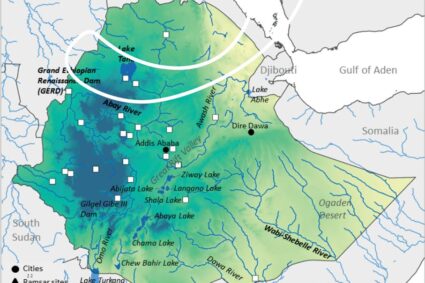
The relations between the two countries have been described as excellent, both politically and economically. For the last two decades, the relationship between Turkey and Ethiopia has been based on economic interest. With Ethiopia’s goal of attracting foreign investment far from its former reality of an economy based on foreign aid, Ankara’s investments to Ethiopia have increased to $2.5bn.

by Ayele Addis Ambelu
Ankara’s relations with “brotherly Ethiopia with which it has strong historical ties” and other African countries are based on partnership, Foreign Minister Mevlüt Çavuşoğlu highlighted.
Ethiopian Embassy building in the capital Ankara, Çavuşoğlu looked back on the two nations’ strategic partnership, noting that Turkey opened its first embassy in sub-Saharan Africa in 1926 in the Ethiopian capital Addis Ababa. “However, our diplomatic ties date even further back,” he said, explaining the ties between countries date back to 1896, making it 125 years since the launch of diplomatic relations.
Ethiopian Foreign Minister Demeke Mekonnen, said that the new embassy will draw the people of the two states together and enhance bilateral relations while promoting cultures.
“Ethiopia and Turkey enjoy a friendship and all-around cooperation. Over the years, the two governments have extended numerous high-level visits that produced very important outcomes that helped expedite the development of joint cooperation on both sides,” Mekonnen said, adding that Ethiopia is ready to deepen and strengthen cooperation with Turkey. The Ethiopian foreign minister also invited Turkish companies to invest in his country.
Over the years the landlocked country in the Horn of Africa has become a primary destination for Turkish investors on the continent. According to the Ethiopian Investment Commission, Turkey is the second-biggest investor in Ethiopia, with an investment capital of $2.5 billion (TL 17.43 billion). The person-to-person interaction and changing perceptions have boosted Ethiopian-Turkish ties and led Turkish companies to employ 30,000 Ethiopians thanks to the multifaceted relations nurtured between the two countries.
Turkey’s top diplomat shared that the countries have set a bilateral trade volume target of $1 billion.
Çavuşoğlu, on another note, commended Ethiopia’s fight against terrorism, noting that Turkey “supports the anti-terror of Ethiopia, Somalia and other African countries very strongly” as a country that has years of experience battling the issue.
Çavuşoğlu also underlined the deep partnership Ankara has with African countries and stated that depending on the coronavirus pandemic conditions the 3rd Turkey-African Union partnership summit would be carried out in Turkey this year.
The Turkish foreign minister noted Turkey’s 42 embassies in Africa and shared that the number will reach 44 with the opening of embassies in Togo and Guinea-Bissau.
Çavuşoğlu also stated that at one point there were only 10 embassies belonging to African countries in the capital Ankara, the number today stands at 36.
“These figures show how strong the ties between Turkey and African countries are,” he said.
Turkey’s bilateral relations with the continent have gained momentum in the last decade and are at a more sustainable place now thanks to Ankara having established high-level contacts. President Recep Tayyip Erdoğan has voiced on many occasions that Turkey wants to deepen its ties with African nations.
Turkey’s engagement with Africa dates back to the adoption of an action plan in 1998, but relations really took shape in 2005 when Ankara declared the “Year of Africa.” Turkey was accorded observer status by the African Union (AU) the same year. In a reciprocal move, the AU declared Turkey its strategic partner in 2008, with relations between the continent and Turkey gaining momentum when the first Turkey-Africa Cooperation Summit was held in the commercial capital Istanbul with the participation of representatives from 50 African countries that year.
Historical relations between Turkey and Ethiopia have received very little attention from the 1920’s to 1991, because Turkey was moving away from its Ottoman heritage in this period. During this period, there is not enough literature on historical relations between Turkey and Ethiopia. Even the insufficient resources available in both English and Turkish mainly address international relations, economic and humanitarian, anthropological and legal issues. Therefore, this study offers an overview of the historical relations between Turkey and Ethiopia from the 1920’s to 1991, seeking to explore the historical relations between the two countries. For this purpose, similar articles, researches, books, magazines, newspapers and internet sources were evaluated, examined and used. Until 1974 the relations between Turkey and Ethiopia were friendly. The opening of embassies in Addis Ababa (1926) and Ankara (1933) demonstrated this friendly relationship. Relations between 1974 and 1991 were not good. Moreover, rela-tions between the two countries have changed with government changes and global events.
H.E. Ambassador Adem Mohamed met with H.E. Mr. Abdullah Eren – President of the Presidency for Turks Abroad and Related Communities (YTB), which is the Turkish Government institution providing scholarships for students all over the world. The Ambassador expressed his appreciation to the Government of Turkey and YTB in particular for their generosity in supporting Ethiopia in the area of human resources development through Türkiye Bursları/ Türkiye Scholarship. The two agreed to work together to support Ethiopian students following their studies in different cities in Turkey and also to further increase the number of Ethiopian recipients of Turkish scholarship












